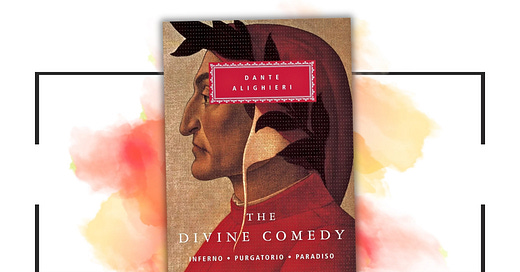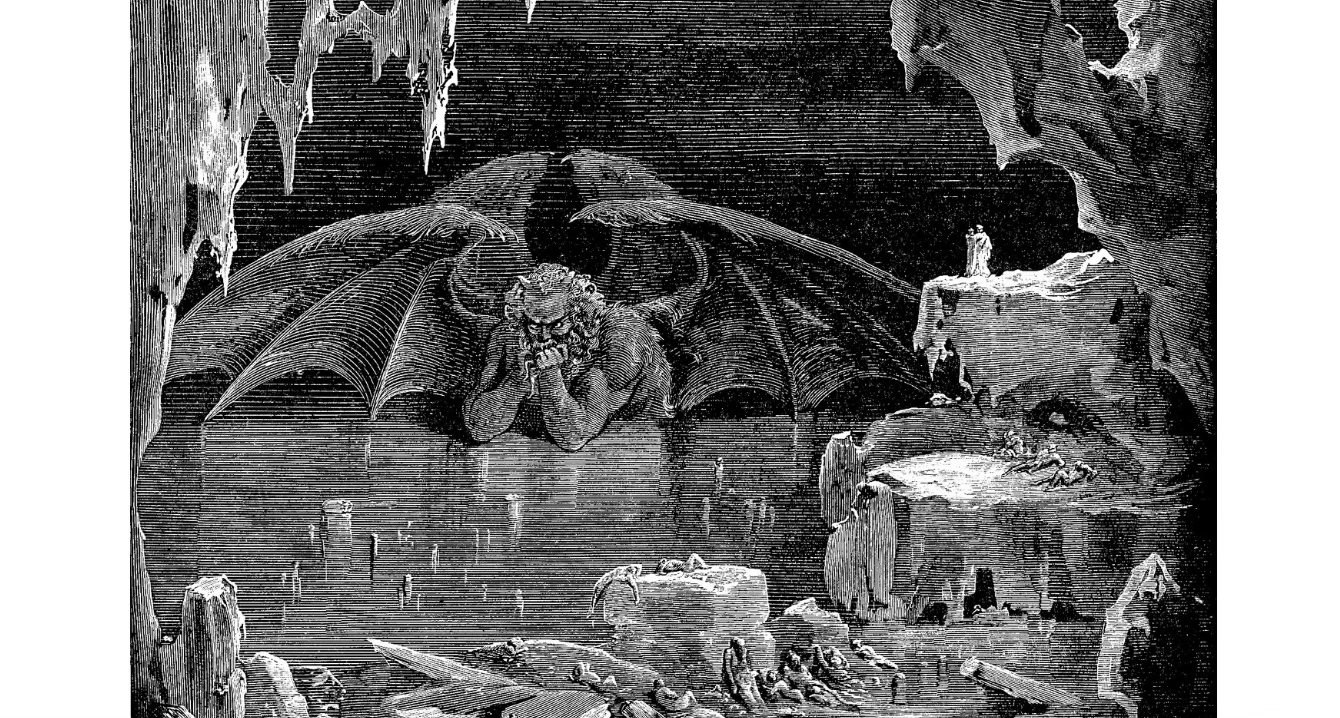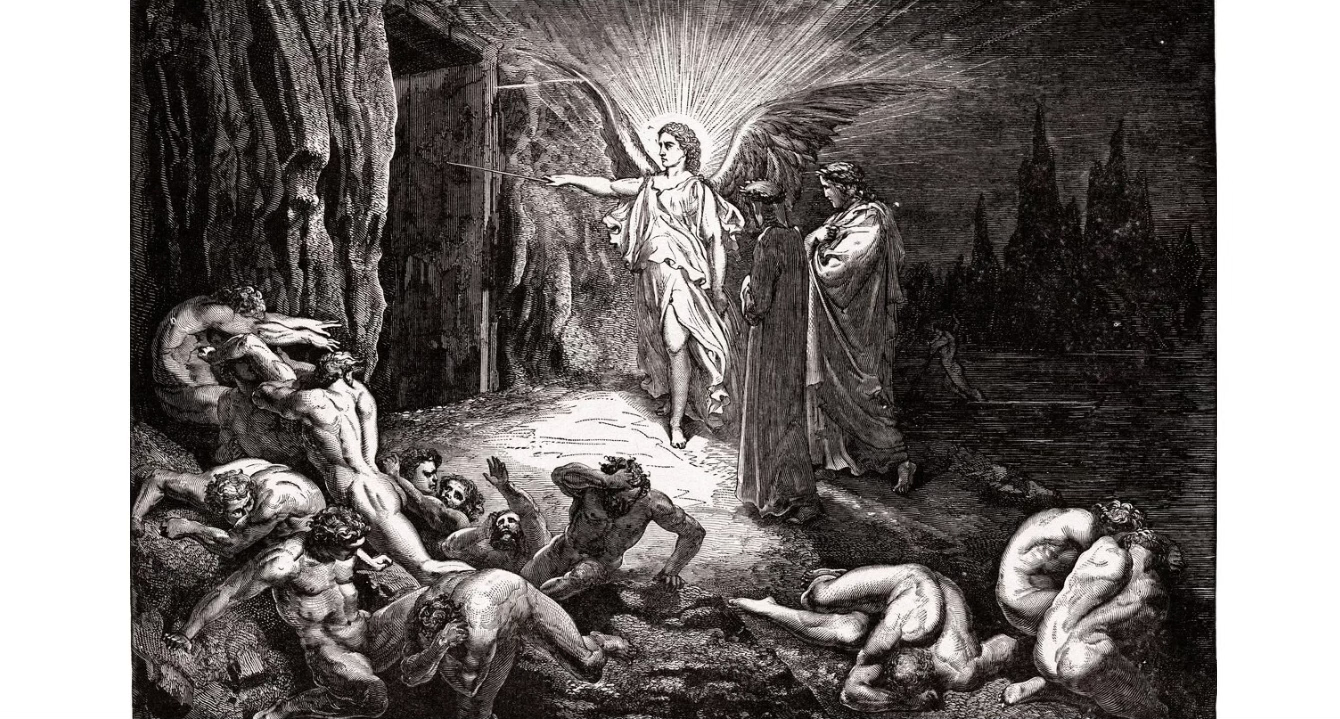The Rewards of Difficult Books
On Dante's "Inferno" and what it can teach us about the pleasures and rewards of reading challenging books.
For a while there, a few years back, I became lazy in my reading. I’d spent half a year reading only for pleasure, a motivation that shouldn’t be devalued but that works to greatest effect in tandem with enlightenment, growth, education, and other high-minded reasons to read. Worse, the kind of pleasure I was seeking from my reading had narrowed to the mere pleasure of a structurally familiar plot. I wanted my books to reassure me, to alleviate the anxieties caused by that year’s ordeals, to affirm a pattern I found stabilising and soothing.
There’s nothing wrong with that in small doses, of course, no more than there’s anything wrong with dessert after dinner. But there must be dinner as well. So, I decided to return to the books that offered intellectual nourishment. David Foster Wallace once said that the job of good fiction is “to comfort the disturbed and disturb the comfortable”. I’d been comforted by fiction for long enough; it was time to be challenged.
Never one to do things by halves, I replaced syntactically simple and thematically bland airport fiction with Inferno, Dante Alighieri’s 14th century theologically dense poem about his imagined descent into Hell. It wasn’t always easy reading, but I’ll be damned to the inferno itself if it wasn’t fun. It was dinner and dessert in one meal. I want to share with you what the experience taught me about the pleasures of reading challenging books.
(A note before we travel further: I’m not inclined to issue spoiler warnings for a seven-hundred-year-old poem. I’m also, however, not about to synopsise Inferno. Go and read it. It’s too enlightening and entertaining to put off reading it for another moment. If your choice is between finishing this essay and picking up Dante, go spend time with the master.)
The Dark Forest
The list of literary sins for writers to avoid often begins with beginnings: Don’t start your story with a character waking up. (Perhaps the only thing worse than this is ending with “... and it was all a dream”.) But having your character wake in a literal dark forest of metaphysical terror can bring life to the cliché. It certainly works for Dante, whose opening lines to Inferno throw the reader straight into the poet’s predicament.
Dante — the middle-aged poet-persona who’d sat down for a brief nap — wakes inexplicably “in a dark wood, where the right road was wholly lost and gone”. So terrifying is this bleak place that Dante finds it “hard to speak of” because “the mere breath of memory stirs the old fear in the blood”. He doesn’t know how he got here, “because [he] was so heavy and full of sleep when [he] first stumbled from the narrow way” — but this tells us a lot.
Dante had grown weary in life and stopped to slack off, resulting in his winding up in this dark forest. Not for nothing the proverb has it that the devil will find something for idle hands to do. This is the moral backdrop against which Dante will discover the rewards of hard work. Sitting still means lingering in this dark place, and the forest is only growing darker.
As I emerged from the cocoon of that year’s escapist reading, I felt like Dante waking in the forest, realising that I’d been asleep for too long. Just as it was now time for the poet to quit napping and find his way out of the dark forest, it was finally time for me to level up my reading game. I turned the first page and pushed on, going deeper into the poem.
Made for Knowledge and Excellence
Fortunately for Dante, he soon meets the Roman poet Virgil, who will act as Dante’s guide “through an eternal place and terrible”. Fortunately for me, I also had a guide: Dorothy L. Sayers’ percipient commentary.1 Her notes are full of insight, and they appear at the end of each canto, thereby circumventing the usual problems of disruption (when footnotes appear, distractingly, at the bottom of each page) and faff (when they appear at the end of the book, and you have to flip back and forth between your page and the final pages).
I have mixed feelings about supplementary texts to difficult books. Some swear by readers’ guides to Finnegans Wake, while others insist on reading expository introductions to any classic novel they attempt. I’m wary of how these sometimes tell you how to read and what to look out for, as opposed to paying attention to what you notice organically. My bottom line is: whatever works. Use whatever grants you access to the novel, by alleviating anxieties about the opacity of the plot, or providing a “key” by which its themes become accessible to you — or go in blind with an openness to experience, however alien to your usual sensibilities.
So, Dante has his guide, but let’s pause for a moment to notice how the two men first meet. Dante comes across a mute figure that crosses his path “as though grown voiceless from long lack of speech”. His speechlessness is resolved the moment Dante speaks to him — cured because Dante speaks to him. Dante then realises this is Virgil, who represents the best of artistic wisdom, the apex of poetry and art. What, then, is revealed in depicting the great poet as speaking only when spoken to?
Inferno is advising us to reach out to art, to engage with it so that it can speak to us. The poem unread, the painting unseen, or the song ignored is an impotent, pointless thing. And not only does an ignorance of art betray art, it betrays us too, causing us to sacrifice important parts of what it is to be human. As Ulysses tells us in a later canto, “For brutish ignorance your mettle was not made; you were made men, to follow after knowledge and excellence.”
Sitting back in the entitled expectation that art should come to the audience while the viewer passively watches is to fundamentally misunderstand the relationship between audience and art. Dante shows us time and again in Inferno how this works. Every tormented soul who has some wisdom or a story to share with the travelling duo shares it only after being engaged by Dante or Virgil. We must prepare ourselves to hear what art might tell us, and approach it in the manner of a request: please tell me your story, teach me what you have to teach.
This is among the first things Dante learns (and we learn through Dante) in his tale: that we must be an active pursuant of art, not a passive consumer. The previously lost and aimless Dante is now ready to descend into Hell. Though Virgil cautions him that he “shalt hear despairing cries, and see long-parted souls that in their torments dire howl for the second death perpetually”, Dante willingly follows his guide, in keeping with Ulysses’ affirmation (in a later canto) that humanity is made to “follow after knowledge and excellence”. Dante foreshadows this advice by closing this first canto with the final, declarative line:
“So he moved on; and I moved on behind.”
All That a Book Can Teach
I’ve forgotten to mention that Dante wants more than simply out of the dark wood; he wants to reach the divine light at the top of a nearby mountain. Why, then, must he travel down in order to eventually rise up? Why the arduous journey to reach that desired destination? In Christine de Pizan’s wonderfully playful 15th century book, The City of Ladies, Lady Reason tells the narrator:
“Have you forgotten that it is in the furnace that gold is refined, increasing in value the more it is beaten and fashioned into different shapes? Don’t you know that it’s the very finest things which are the subject of the most intense discussion?”
Similarly, in The Hero and the Blues (1973), Albert Murray writes:
“The fire in the forging process, like the dragon which the hero must always encounter, is of its very nature antagonistic, but it is also cooperative at the same time. For all its violence, it does not destroy the metal which becomes the sword. It functions precisely to strengthen and prepare it to hold its battle edge ... The function of the hammer and the anvil is to beat the sword into shape even as the most vicious challengers ... jab, clinch, and punch potential prize-fighters into championship condition.”
This is precisely why Dante can’t hop-skip-and-jump his way effortlessly out of the forest, but must follow Virgil down into the belly of Hell before clawing his way back up: because it’s only through struggle that meaning and value are found. The same is true of our reading; we get out what we put in, and I promise you that if you put in the work to meet the challenges of difficult books, you’ll experience a pleasure that surpasses that of passive reading. It’s a kind of joy only found in becoming more than you currently are.
While Inferno is full of readerly pleasures, it’s also hard work at times. There will likely be moments in which the reader feels like Dante reaching canto twenty-four and its series of trenches, which he must climb up and over to reach the centre. “My lungs were so pumped out,” he says, “I just had not breath to go on.” But Virgil coaches him through this:
“‘Put off this sloth,’ the master said, ‘for shame!
Sitting on feather-pillows, lying reclined
Beneath the blanket is no way to fame —
Fame, without which man’s life wastes out of mind,
Leaving on earth no more memorial
Than foam in water or smoke upon the wind.’”
Prior to his fateful midlife nap and waking in the dark forest, Dante was no intellectual slouch. He tells Virgil that he had spent “long hours pondering all thy book can teach”. This wasn’t because of some proto-Protestant work ethic or a scolding teacher hovering at his shoulder; he adored Virgil’s work because Virgil was “that fount of splendour whence poured so wide a stream of lordly speech”. The work of reading great literature is its own reward.
There are only 34 cantos in Inferno, each a mere 3 or 4 pages, which means you could quite comfortably read the entire poem in a month. By the time you’ve read it, I suspect you’ll be eager for more, keen to climb with Dante up the mountain of Purgatory in the next book. Perhaps you’ll want to take on something more difficult, reading your way up to your own personal heavyweight category of literature. There’s always more to challenge you and more to gain from the effort. As Virgil says:
“More stairs remain to climb — a longer flight;
Merely to quit that crew suffices not;
Dost take my meaning? Act, and profit by it.”
Sayers’ translation of Dante also provides all the quotes used here. Not being able to read in the original Italian, I have no personal measure of how good any translation is compared to any other, but various sources seem to rate hers highly enough. From the perspective of the lay reader, as I was going into The Divine Comedy for the first time, the translation is eminently readable and poetically melodious. I never felt spoken down to by the text, nor baffled by it.







